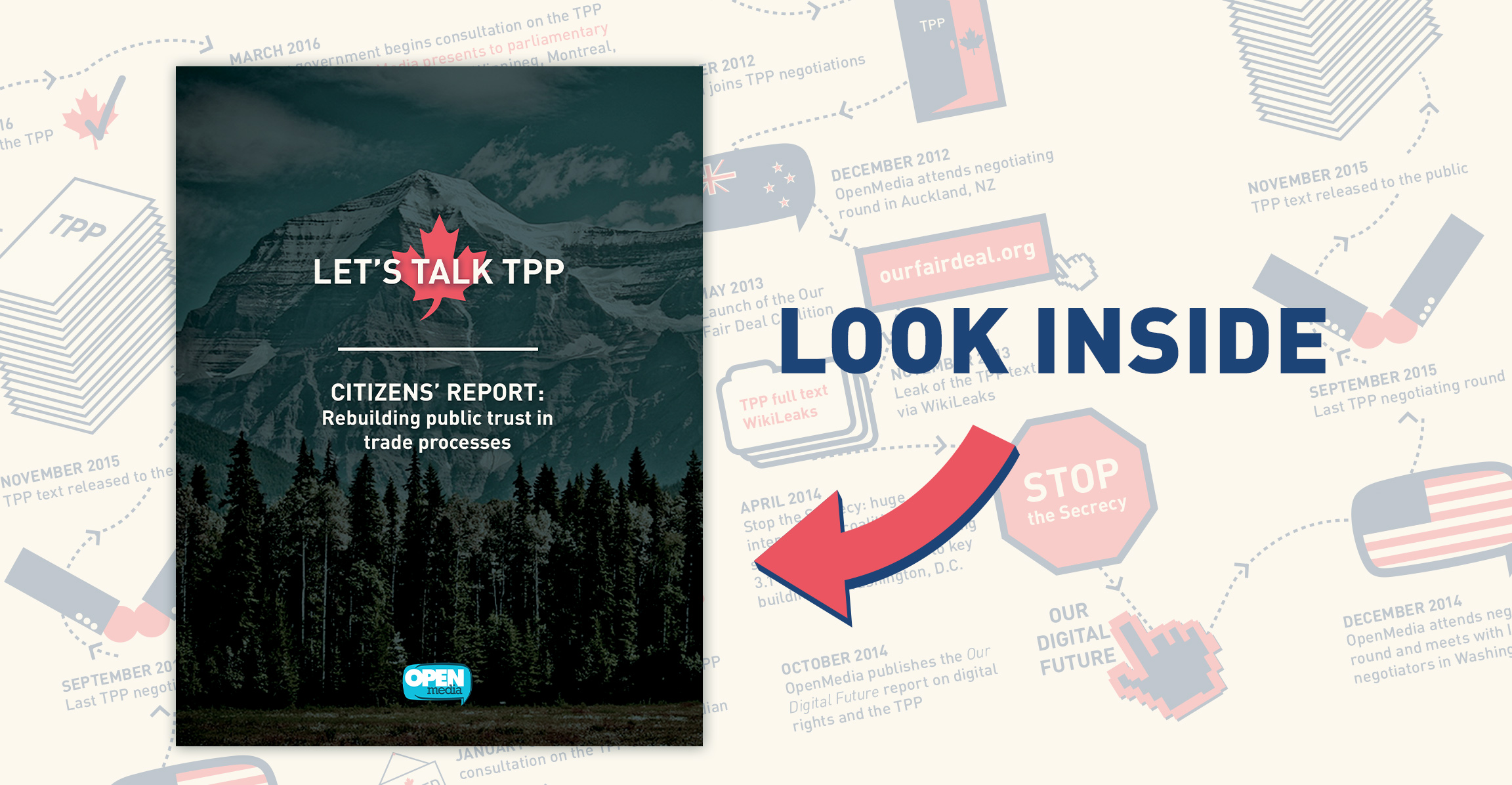After four years of campaigning on the TPP, your OpenMedia team has been fairly quiet on the trade front recently. But it’s not because we’re not paying attention, but because we’ve been working on something big.
Next week we’ll be launching our long-awaited TPP Citizens’ Report. This initiative draws on the feedback Canadians provided using our Let’s Talk TPP tool — examining comments submitted to the Standing Committee on International Trade (CIIT) as a part of its study and public consultation on the TPP. In broad strokes, the report uncovers the reasons why Canadians oppose the TPP — and the biggest takeaway message was that people cannot support agreements on which they were not consulted.
The report makes three key recommendations — two of which are forward-looking, and intended to help guide the government on reforming trade negotiation processes to ensure Canada can be successful in future agreements, restoring public trust through genuine transparency and multi-stakeholder engagement.
This work comes at a crucial juncture for our government as it considers how it will move forward with a number of upcoming and ongoing trade processes. Early next week, Trade Ministers from TPP nations will be meeting in Chile to “find an alternative Asia-Pacific trade pact.” In early February, Canada’s new International Trade Minister, François-Philippe Champagne, confirmed that he would be attending the meetings, saying that “the world is looking at Canada…when it comes to open, progressive trade.”
If this government is truly committed to open, progressive trade, it will heed the concerns raised by Canadians during TPP consultations, and take immediate action to ensure that those concerns are fully addressed in any future agreements.
While it appears that the TPP is dead, some are still hoping that it can be resurrected, or at least that parts of it can. In particular, Japan has been applying pressure on TPP nations to move forward with some version of the defunct agreement — which was effectively rendered obsolete when the Trump Administration signed an executive order in early January, pulling the U.S. out of the deal.
Citizens and advocates in TPP nations seem to agree that the agreement belongs in its grave. This week, more than 200 civil society organizations, including OpenMedia, signed onto an open letter, asking that ministers resist the urge to resuscitate the TPP, saying:
As representatives of many millions of people in a wide range of unions, civil society groups and social movements, we believe that the TPP text, negotiated in secret, served the interests of large corporations at the expense of governments’ rights to regulate in the public interest and of our fundamental rights as citizens.
Pursuing (or being pursued by?) a zombified TPP in any form would be a huge mistake for the Canadian government, especially given that many of the most distasteful concessions were made by Canada at the behest of the U.S. — a particularly salient point when it comes to digital policy, copyright, intellectual property and the innovation economy. Foreign Affairs Minister — and former International Trade Minister during the TPP’s signing — Chrystia Freeland has basically admitted as much, saying, “these agreements are very delicately balanced deals, and everyone makes different concessions based on the concessions they’re getting. If the U.S., with its huge market, is taken out of that picture, then a new calculus would apply to everyone.”
While we don’t agree that the concessions Canada was making were acceptable even with the U.S. in the agreement — to capitulate now would be cutting off our nose to spite our face.
What’s more, with NAFTA renegotiations on the horizon, and Canada headed into negotiations on a bilateral FTA with China and possibly the UK as well, it’s clear that issues of trade are not going anywhere. Yet Canadians have lost trust in the process, and are speaking out en-masse about our broken trade negotiation mechanisms.
So what now?
There is a path forward — but it involves rebuilding public confidence in a system that has ignored the concerns of citizens for far too long. The utilitarian maxim that trade is supposed to do the most amount of good for the most amount of people, as a rising tide lifts all boats, is no longer believed by Canadians — particularly when we see processes co-opted by corporate lobbyists to usher in policies that would never be passed by our national parliament. (Oh hi, copyright term extensions — I didn’t see you there!)
This kind of policy laundering leaves a bad taste in the mouths of individuals who support international trade, but want to see it move forward the interests of Canadians as a whole, rather than the current system of horse trading that secures benefits for a wealthy few at the expense of the many.
In our report, we’ve made recommendations that we believe will shed sunlight on the murky world of trade negotiations, and give Canadians a seat at the table, instead of begging for scraps. Watch this space for the report next week — and stay tuned for more information on how you can call on your elected representatives to put the interests of Canadians first when it comes to trade.
Please chip in to keep stories like these coming.
Image: OpenMedia.org




